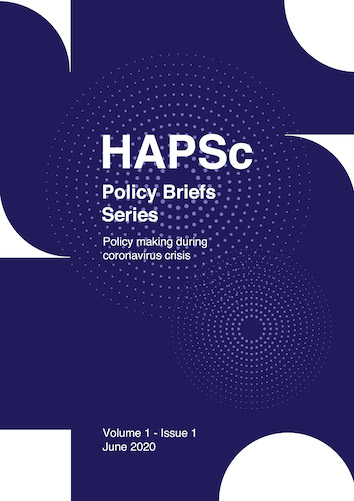EU Policies in time of coronavirus crisis
Abstract
This paper seeks to uncover the link between the current crisis in the field of migration and asylum policies and the rise of populist polarization in Europe. Provided that normative consistency serves effectiveness, the study reflects on the existing literature, selected legislative acts, and cases. Hence, criticism against the European Union’s heterodetermination and inertia in the political debate is simmering. Populist phenomena all over the spectrum define the supranational policymaking, outweighing voices of inclusion and democracy, if not the very essence of the Union’s value-based system. Contrariwise, liberal democracy shall not only be capable of defending itself and including the alien when the fears come true but also educating its citizens in the democratic realm before enforcement promptitude is practically imperative. All in all, primary and secondary legal norms entail adequate solutions to address the issue institutionally, subject to political determination, and courage.
Article Details
- Zitationsvorschlag
-
Koutsopoulou, D.-G. (2020). EU Policies in time of coronavirus crisis. HAPSc Policy Briefs Series, 1(1), 30–36. https://doi.org/10.12681/hapscpbs.24945
- Rubrik
- Articles

Dieses Werk steht unter der Lizenz Creative Commons Namensnennung 4.0 International. Authors retain copyright and grant the journal right of first publication with the work simultaneously licensed under a Creative Commons Attribution License that allows others to share the work with an acknowledgement of the work's authorship and initial publication in this journal.
Downloads
Keine Nutzungsdaten vorhanden.
Literaturhinweise
Bogdany, A. von (2009). Founding Principles. In: Principles of European Constitutional Law, Hart, CH Beck, Nomos, 13-14.
Bartels, L. (2009). Trade and human rights. In: Bethehem, et al.(eds.), The Oxford Handbook of International Trade Law. Oxford: Oxford University Press, 571-596.
EU, Euratom (2014). Regulation No 1141/2014 of the European Parliament and of the Council of 22 October 2014 on the statute and funding of European political parties and European political foundations, OJ L 317, 4.11.2014, p. 1–27, Latest consolidated version: 27/03/2019,
European Commission (2017). Reasoned Proposal in Accordance with Article 7(1) of the TEU regarding the Rule of Law in Poland, COM(2017) 835, December 20, 2017.
European Parliament (2018). Resolution of September 12, 2018, A8-0250/2018, on a proposal calling on the Council to determine, pursuant to Article 7(1) TEU, the existence of a clear risk of a serious breach by Hungary of the values on which the Union is founded.
Habermas, H. (2015). Democracy in Europe: Why the Development of the EU into a Transnational Democracy Is Necessary and How It Is Possible. European Law Journal, 21 (4): 546-557.
Howse, R. (2019). Epilogue: In defense of disruptive democracy—A critique of anti-populism. International Journal of Constitutional Law, 17 (2): 641-660.
Kaltwasser, C. R. et al. (2018). The Oxford Handbook of Populism. Oxford: Oxford University Press.
Kochenov, D. (2017). The EU and the Rule of Law – Naiveté or a Grand Design? In: Adams, M., Hirsch Ballin, E. & Meeuse, A. (eds.), Constitutionalism and the Rule of Law: Bridging Idealism and Realism, Cambridge: Cambridge University Press, 419–444.
Kochenov, D. (2019a). Article 7: A Commentary on a Much Talked-about “Dead” Provision, Polish Yearbook of International Law, 5-6.
Kochenov, D. (2019b). Busting the myths nuclear: a commentary on Article 7 TEU. European University Institute Working Papers, LAW 2017/10.
Mestmacker, E. (1994). On the legitimacy of European Law, 58 RabelsZ, 615.
Morijn, J. (2019). Responding to “populist” politics at EU level: Regulation 1141/2014 and beyond. International Journal of Constitutional Law, 17 (2): 617–640.
Mudde, C. and Kaltwasser, C. R. (2018). Studying Populism in Comparative Perspective: Reflections on the Contemporary and Future Research Agenda. Comparative Political Studies, 51 (13): 1667–1693.
Weiler, J. H. H. (1991). The transformation of Europe. The Yale Law School Journal, 100 (8).
Shaw, J. (2017). The European Union and global constitutionalism. University of Edinburgh School of Law, Research Paper Series, No 2017/02.
Thym, D. (2016). Ambiguities of Personhood, Citizenship, Migration and Fundamental Rights in EU Law In: Azoulai, L., Barbou S., Places des and Pataut, E. (eds.), Constructing the Person. Rights, Roles, Identities in EU Law, Hart, 118-124.
Treaty on European Union (TEU) (2012). Consolidated Version. Official Journal of the European Union, C 326/15, 26.10.2012.



